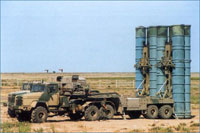Iran Is A Hard Nut to Crack for Israel, Even Without Russia's S-300 Systems
Iran has launched five-day Modafean (Defenders) exercises to guarantee protection for the nation’s nuclear objects from a possible attack from Israel or the USA.

Ahmad Migani, the chief of Iran’s Air Defense said that the exercises were launched to improve air defense of Iran’s key cities and the nuclear power plant in Bushehr. The exercises will therefore cover nearly a third of Iran’s territory. The Iranian Army will train its ability to repulse a possible bombing of the nuclear objects of the nation.
"Be sure that in case of any aggression, the Zionists' F15 and F16 aircrafts will be trapped by our air defense and will be destroyed," Commander of the IRGC Aerospace Force Brigadier General Amir Ali Hajizadeh said.
"And if one of their aircraft manages to escape Iran's air defense - before it can land - the bases from which these aircraft have taken off will be struck by our destructive ground-to-ground missiles," the Commander said in a reaction to Israelis growing war rhetoric against Iran's peaceful nuclear program.
"The Zionists may initiate such a war, but undoubtedly its end will depend on our will," Hajizadeh noted.
Nevertheless, many military experts say that Iran’s “miraculous” arms may somehow strike neighboring Arab states, merely incidentally.
Iran reportedly plans to test-fire Shihab and Sejil long-range missiles too. The missiles may hit targets within the range of 2 kilometers, which is enough to strike the territory of Israel.
Israeli experts stated that they were not impressed with Iran’s air defense drills because Iran did not have state-of-the-art S-300 missile systems, which Russia refuses to deliver to Iran. As long as the rogue state does not have these complexes, its missile defense system is incapable of causing serious damage to Israeli aviation.
Russia ’s Tor-M1 systems are the most contemporary of Iran’s air defense hardware. Russia delivered 29 of such systems to Iran in 2007.
Military expert Konstantin Sivkov said in an interview with Pravda.Ru that Israel will have to face considerable difficulties if it decides to strike Iran.
“First of all, it is the distance. They will have to refuel their jets in the air twice to cover the distance. Israel does not have the required number of tanker aircraft for that, and the nation will have to ask the United States for help.
“Secondly, Israel will have to take account of Iran’s Tor-M1 systems. Iran also has US-made F-14 jets – about 70 of them in total, but only 30 of them are operable. But this amount of planes will be enough for efficient defense. F-14 jets are very well equipped and can detect targets at a distance of up to 300 kilometers. The range for F-15 and F-16 is lower – 200-250 km, which means that Iranian planes are much better than those of Israel.
“Finally, Israel will have to attack eight nuclear objects in Iran at once, which is hard, of course. They will need to have approximately 60 jets for that, as well as refueling aircraft, reconnaissance aircraft, radar stations and so on. Even if Israel tries hard, it will be able to destroy only three nuclear objects. If Iran eventually receives S-300 systems – all of its nuclear objects will remain unharmed, but Israel will lose up to 40 percent of its jets.
Sergey Balmasov
Vadim Trukhachev
Pravda.Ru
Read the original in Russian
Subscribe to Pravda.Ru Telegram channel, Facebook, RSS!


